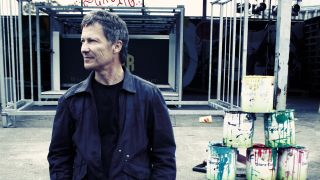“I didn’t know what to expect at all in China,” says guitarist Michael Rother, speaking about his gigs in Beijing and Shanghai in December 2014. “We were blown away by the amazing reception we got. I can’t remember many events in which the response was so enthusiastic. The crowd were cheering, going nuts when we went on stage. People were going wild, hopping around the venue. They started running around to the music and were having the time of their lives.”
Looking relaxed and quick to smile, the co-founder of NEU! and Harmonia is more than happy to be talking about his work on the eve of a tour that will take him to London and across Europe. When he describes that reception in China, a reaction also echoed in countless clubs and on concert platforms around the world, you can tell he’s genuinely baffled by it all. There’s no false modesty with Rother. In conversation, he’s apt to play down his work somewhat with a self‑deprecating humour.
He’s also someone who’s got his feet firmly on the ground when it comes to taking his music on the road. Not only is he likely to have negotiated the contract with the promoter and booked the hotel rooms and transport himself, in concert he sets up his own equipment and takes it down at the end of the night.
“I’m not one of those players who has someone else do everything for them. It’s something German in me, maybe,” he laughs. “I’m sure a British band would have a team of roadies.”
Though gratified that his gigs achieve such acclaim, he has no explanation as to why that may be the case. “If you’d asked me 20 years ago, ‘Do you think you’ll be travelling across the world in 20 years’ time to play to all these people?’ of course I would have said no.”
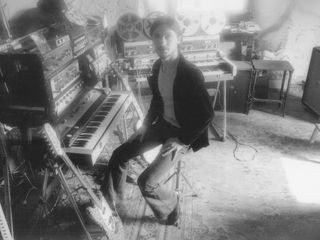
No artist ever embarks on a career with the express aim of changing lives and, as a result, alter the world around them in both subtle and not so subtle ways. But the by-product of what Rother has been doing has meant that very quietly, with a minimum of fuss, over the last four decades, that’s exactly what’s happened.
Filled with insistent beats, surging layers of flowing, grainy guitars, eddying ripples of distortion and tape-manipulated textures, the urgency of NEU!’s debut remains just as potent as it was in 1972. That animating and animated spirit within the music vibrates outwards. Possessed of an unwavering momentum, it resolutely moves forward as though tracking and tapping into the energies of an ancient, invisible ley line that leads inexorably toward some far horizon.
If you’d asked me 20 years ago, ‘Do you think you’ll be travelling across the world in 20 years’ time to play to all these people?’ of course I would have said no.
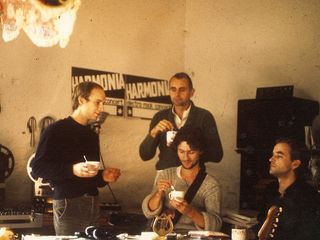
Over 40 years since its release, it still sounds utterly contemporary. The shock isn’t so much about how far ahead of the time NEU!’s debut, NEU! 2 and NEU! ’75 sound, but just how far the ripples occasioned by its release have travelled. Aside from the more high-profile cheerleaders such as Brian Eno and David Bowie, whose later work on albums such as Another Green World, Low and “Heroes” was irradiated by the ideas Rother and the band’s co-founder and drummer Klaus Dinger were channelling, countless swathes of post-punk outfits, electronic music boffins, psyched-out cosmic rockers and dance music DJs have all been touched and galvanised by NEU!.
Even the more genteel, less motorik grooves and atmospheres of Harmonia, the group Rother created with Cluster’s Hans-Joachim Roedelius and Dieter Moebius in 1973, are no less lauded by the great, the good and the obscure alike. It’s no surprise that in 2015, Harmonia’s box set, Complete Works – collecting their original albums, rare studio archives and live material – sold out its entire run within a fortnight of its release. Rother, who compiled and oversaw the set, is once again pleased but bemused at the attention. He notes ruefully that while NEU! and Harmonia are feted now, with no shortage of column inches and pixels liberally splashed about them in the mainstream and specialist press, and all over the internet, at the time they were largely ignored by the press and the music-listening public alike.
Rother recalls his first meeting with Roedelius and Moebius at their house in Lower Saxony’s Forst in early 1973. He had originally gone to ask if the duo were interested in joining Dinger and himself on stage to perform NEU!’s music live.
The dissolution of NEU! and then Harmonia in 1976 might appear as a setback but it forced Rother to embark on a solo career, the very last thing he’d considered. “When Roedelius and Moebius decided to quit, I was disappointed. But then often in life, when you are forced to make a change, it takes you somewhere else. It was not my decision and I had to accept it. I thought, ‘Well, now I will do some recordings on my own.’ I released Flammende Herzen in 1977 and suddenly it took off like a rocket! It sold five times as much as NEU! and, I don’t know, 100 times more than Harmonia. I can’t explain why that was.”
From there, a steady string of well‑received albums appeared through the 1980s, but Rother’s output eventually slowed down, with Esperanza in 1996 and Remember (The Great Adventure) in 2004. That his productivity as a solo artist has fallen to zero is nothing to do with any indolence on Rother’s part. “I’ve not been playing golf,” he laughs.
With two movie scores under his belt and numerous live collaborations since then, he admits that the recording studio isn’t where he wants to be. “I lost interest in my own studio, chewing on material until I go mad. When I look at that, compared to the joy of playing live with other musicians…” He pauses, perhaps thinking of that tumultuous reception in China and elsewhere. “I definitely prefer playing live,” he grins.
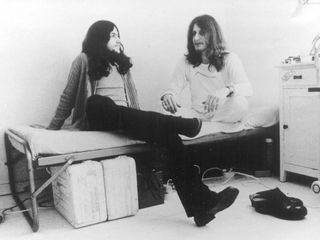
“Of course I had my guitar with me and I jammed with Roedelius. He was playing his fuzzy piano sounds and I immediately felt that I’d entered a new chapter. I knew it would take me to a completely new continent. Roedelius felt the same and then Dieter Moebius joined in and we knew the three of us had something we could work on. I moved to Forst just a couple of weeks after that first visit. It was very quick. For me it was totally clear that I had to find out what I could develop with those guys.”
That Harmonia proved to be, in his words, “a complete commercial disaster”, with Musik Von Harmonia (1974) and Deluxe (1975) gaining little traction beyond a small, faithful band of followers, perplexed and dismayed Rother. “I thought everyone would love it as much as I did. That was my compass: I will do what I love to do and if I’m convinced, let’s see what other people make of it. But I always hope they’ll share my love of it. Sometimes that happens and sometimes not. In the case of Harmonia, it took 30 or 40 years for people to find that love.”
It’s very important to me to move forward but it’s also true that the basic concepts behind NEU! and Harmonia and my early solo stuff, those haven’t changed.
Having begun as a teenager playing guitar in a covers band, knocking out the hits of the day by The Beatles and The Kinks in Germany, by the late 1960s Rother, like so many of his generation, understood the need to find his own voice as an artist. “I couldn’t do that by taking influences from outside. The logical next step was to not listen to other people. I then started stripping out all the things I had learnt in the years before that belonged to British or American pop culture, and all my ‘guitar hero’ stuff, like playing licks faster than the speed of light – I stopped all that.
“I was very fortunate to run into others who were on a similar path, like the Kraftwerk people,” he says of his time as a member of that band’s early line-up in 1971, where he and Klaus Dinger joined Florian Schneider. “When I met them, that was the first time I was not totally alone with the desire to forget the musical clichés of the 60s. I knew I had to forget about blues. As much as I respected Jimi Hendrix and all those different people, that’s a different cultural background. That was the way my work developed. I found inspiration in my work with Florian Schneider, Klaus Dinger, Hans-Joachim Roedelius and Dieter Moebius.”
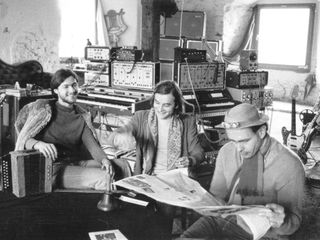
Joined by his old friend, La Düsseldorf drummer Hans Lampe, along with guitarist Franz Bargmann from the Berlin band Camera, Rother is currently working on new material, as well as playing highlights from NEU! and Harmonia, and he’s clearly enjoying the attention.
“It’s very important to me to move forward but it’s also true that the basic concepts behind NEU! and Harmonia and my early solo stuff, those haven’t changed,” he says. “So far I haven’t experienced that as a burden because I still enjoy playing those tracks. If we talk again in 10 years’ time, maybe then I will feel differently!”
Once again, Michael Rother is laughing as the rest of the world catches up.
Michael Rother plays the Green Man Festival in the Brecon Beacons National Park on August 20. Visit Rother’s website for more information.
Classic Kosmische
Brilliant moments from Michael Rother’s back catalogue.
HALLOGALLO
Neu! (NEU!, 1972)
Having scraped together the budget for the record themselves, NEU!’s debut album was finished in just four days. “Producer Conny Plank was so important to this album. I had a wah-wah and used the feedback I had in the studio which led to these long lines that just kept on going, which could then be faded in and out. Conny turned round the tapes at a certain point and I was totally blown away by the backwards sounds. The beauty of a track like this is in the frailty of it: take away just one element and the whole thing will fall apart. There’s only one track [on the album] that has a harmonic change, Weissensee. I remember clearly thinking if it was really necessary to have that change. I juggled with that thought and came to the conclusion that it was.”
Monza (Rauf Und Runter)
Deluxe (Harmonia, 1975)
Rother says he has trouble singling out Harmonia tracks but admits songs like Watussi, Dino and Ohrwurm from the band’s first album are among some of his favourites. From Deluxe, he cites Monza (Rauf Und Runter). “It’s not very typical of Harmonia but I remember having so much fun recording and mixing it. We were going totally crazy, enjoying ourselves, adding vocals to the drive of the guitar, drums and bass. I know Klaus [Dinger] was a bit upset as he thought it belonged on a NEU! album.”
HERO
NEU! ’75 (NEU!, 1975)
On this track, said to have influenced David Bowie, Klaus Dinger, who died in 2008, can be heard propelling the piece with a beat that presages punk, as well as bellowing out the vocals. Of their turbulent and, later, acrimonious relationship, Rother says: “Klaus was such an amazing artist. He was also a very difficult person and became more difficult over the years. I sometimes read what’s been written about us and people imagine that when Klaus and I worked together, we would be fighting all the time. We never fought about the music. Never. Not once. We might have been fighting about the concept or whatever was going on outside the studio but never about the music. I loved his contributions and he loved what I did, and we both knew that the music was the combination of the two of us.”
Almost
Tracks And Traces (Harmonia & Eno, 1976)
Evoking the idyllic pastoral surroundings in which they worked with Brian Eno, Rother recalls it as a special time. “We were talking, drinking tea, going for walks. Of course, musicians can’t stop themselves from making music so then we ended up playing and recording in the studio together. I made a rough mix of everything we’d done, I think more than 40 sketches, before Brian left us to go back home. Some of them were only a few seconds long – just somebody starting with one sound and the others listening and joining in. That was a very relaxed way of doing things and the opposite of how things were in NEU!.”
